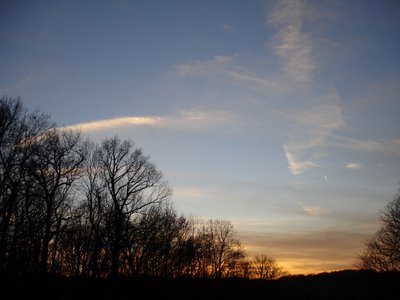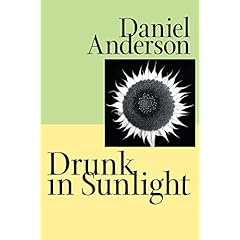Let us now praise books and verse.

Today, for the first time in my three years at this place, I managed to be in town for employee appreciation day at the bookstore, which meant 30% off of anything I cared to buy. I cared to buy. Bibliomania might be too gentle a word for the condition with which I live. I won't say it's a condition I suffer, though it's had its downsides over the years (not least, the high monetary and physical costs of moving two tons of books even the short distance from upstate New York to central Ohio). Book buying is an experience of greatest comfort and reassurance to me. It is a peopling of my world. It is a finding of voices that teach me better how to sing and to sorrow, how to hold myself open even when the light wanes and frost follows roof-shadows to stripe the lawns of my waking.
I am in pursuit of ecstasy in this life of mine; I suspect you've got my number by now, those of you who read here consistently. I suspect that things would go more easily with me if I settled for a middle road; in risking myself, I all too often (especially this year, it would seem) come collapsing back in pained frustration. But there's a reason for my enduring love of that Matisse paper-cutting of Icarus. That's what it's like to be me, there with that burning coal reddening the breast. I don't burn low. And often I end up consuming myself. But oh, I'd rather have this fierceness than something more tepid. I'm going to continue gambling that this choice (if choice it is) will pay off--if in no other way than in my knowing that I'm living all the way up, to the best of my ability. The numbers all go to eleven here. It's a life of lava-lymph.
And yet it is a tempered ecstasy I'm after. The reason yesterday's word-find settled me so much and so deeply is that I've been trying to center in, this week, to quiet and collect and compose myself after many weeks of having lost my focus altogether. All day I have been drawing strength from this new exhalation that "elne" represents to me. It's just possible that one of my rings will be picking up an interior engraving during the remainder of the week, so that the word is always there among my reminders, pressed to the flesh of one of the fingers with which I do the work I have been given.
One of things that has come to center me this year, more than any year in my life, is reading poetry. It's so strange a thing: I feel myself a complete novice in the company of poetry, and of poets for that matter. Nothing widens my eyes quite as having poetry read to me does; nothing makes me feel more like Maggie Tulliver in Mill on the Floss, when George Eliot describes her as having her soul "played on...by the inexorable power of sound." When Maggie listens to music, Eliot tells us, "You might have seen the slightest perceptible quivering through her whole frame as she leaned a little forward, clasping her hands as if to steady herself; while her eyes dilated and brightened into that wide-open, childish expression of wondering delight, which always came back in her happiest moments" (bk. 6, ch. 7). Great rushes of sound are what work on Maggie's soul. In just the right mood, I too can be swayed by music. But what sways me more than anything is language at its best. Poetry, read aloud, plays me (to borrow from that chapter of Eliot's novel one more time) as if I were "constructed of musical strings."
It has been one of the richnesses of my semester to get to hear reading after reading here, and we're not quite finished yet. And it's one of the delights of my day that I'll leave it with two new books of verse. One is not, strictly speaking, new: it's Ilya Kaminsky's Dancing in Odessa (2004). Kaminsky opens his volume with an Author's Prayer, the end of which I love quite a lot:
Even sleep is a prayer, Lord,I love the beginning of it, as well, but I'm not going to quote the whole thing. You should read this book.
I will praise your madness, and
in a language not mine, speak
of music that wakes us, music
in which we move. For whatever I say
is a kind of petition, and the darkest
days must I praise.
 The other book that goes with me out of my day is the just-arrived Drunk in Sunlight, by my excellent poet colleague Danny Anderson. I'm super thrilled to recommend this book, of which I actually will own two copies soon enough, since I managed not to cancel my Amazon order in time after having placed an order directly with Johns Hopkins UP. (Somehow I managed to misremember the publication date. I blame They Call Me Naughty Lola, that collection of LRB personal ads [which is forthcoming in December] that you know I pre-ordered the moment it was titled.) Anyway: you too should own a copy. Click the sunflower. Place an order.
The other book that goes with me out of my day is the just-arrived Drunk in Sunlight, by my excellent poet colleague Danny Anderson. I'm super thrilled to recommend this book, of which I actually will own two copies soon enough, since I managed not to cancel my Amazon order in time after having placed an order directly with Johns Hopkins UP. (Somehow I managed to misremember the publication date. I blame They Call Me Naughty Lola, that collection of LRB personal ads [which is forthcoming in December] that you know I pre-ordered the moment it was titled.) Anyway: you too should own a copy. Click the sunflower. Place an order.Even greater than my blessing in getting to attend so many poetry readings this semester has been the blessing of simply getting to be around both Danny and my other poet colleague, G.C. Waldrep. Their aesthetics are completely different, and when they did a double-header reading in September, I think we all waited to see what the effect would be--which is not to say that any of us thought it would be anything but splendid. Instead, I think we were waiting to see what kind of splendid it would be, if splendidness can be taxonomized. (Not a one of us was anything less than thrilled, might I add.)
I'd read Danny's work (you, too, can read it here and here and here; these pieces are all from the new book), and I already knew how terrific he is as a person, even before the end of September. But what emerged from hearing the poems aloud, and hearing the stories he tells about his works, is the gentle dryness of humor that animates him as a person and that becomes a quiet, graceful, profoundly generous wisdom and wry loveliness in his poems. The poems themselves are eminently approachable. They are about a world you may know, and they reach to your ear in language you probably use. They work in formal rhyme and meter--these are not free verse works--but their technique is never obtrusive. It is light and deft, inviting you onward and building its powerful, even devastating, effects through an accumulation of genuine humility. So it is that "Question," from midway through Drunk in Sunlight, can ask at an early moment, "Is this a ghost of summer camp?" (even as the facing page begins with "The sudden whipcrack clarity of love") but can then build to a meditation on the experience of feeling a poem take shape in and from and for the world around a watching poet:
The dragonflies, they come againIt's simply a lovely book, and by simply I mean deceptively so. It is the right thing to be reading as the days darken down; its poem "First Frost," just for another instance, is harrowing and consoling all at once in its flickering revelation of coming winter, of inevitable death. This collection is one among many things to give thanks for this year. Let the restless province of your eye be troubled, and enchanted.
Like blue allusions, silks of thought.
They jostle, tease, and occupy
The strangest quarters of your mind,
Enchanting, sometimes troubling, too,
The restless province of your eye.


0 Comments:
Post a Comment
<< Home